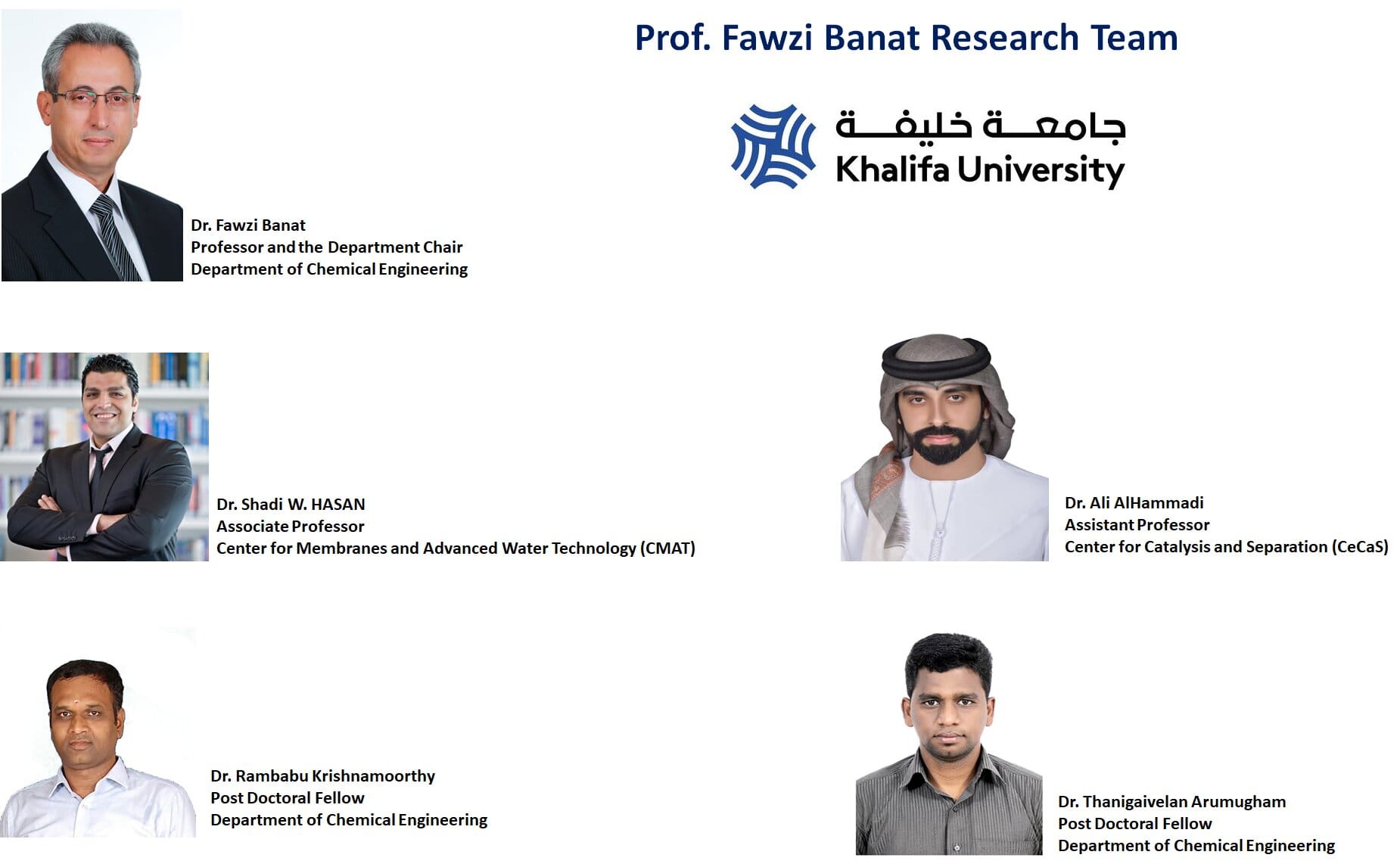Registered team

FUTURE
United Arab EmiratesAbout the team
Sustainable processes and a clean environment are key global challenges in the 21st century. Our team has been working extensively as a lead research group to accomplish these objectives in the field of energy and environmental applications.
Prof. Fawzi Banat Research Group is a world-leading research group at the Department of Chemical Engineering, Khalifa University, Abu Dhabi. With more than 25 years of experience in the field of water/wastewater treatment, waste utilization and management, nanotechnology, and process design and scale-ups, the research group has successfully executed >10 industrial and government-funded projects. Prof. Banat, the Team lead, has established the water management lab, flow assurance lab, and foaming lab at the ADRIC research center for high-quality research activities. He has also led the team to focus on a wide spectrum of research interest in water and wastewater treatment, desalination, and waste management. Our research team is genuinely interdisciplinary with up-to-date research facilities, aiming to solve fundamental and practical problems associated with various industrial applications related to scale-up and commercialization.
Some of our recent successful research areas are presented to highlight the team's multidisciplinary potential: Membrane for oily water removal applications (Journal of Water Process Engineering, 2020, 35, 101545), Forward osmosis membrane for desalination (Chemosphere, 2020, 261, 127687), Direct contact membrane distillation for desalination (Separation and Purification Technology, 2020, 252, 117416), bio reductant for effective dye degradation (Journal of Hazardous Materials, 2020, 402, 2020).
Our research team consists of highly skilled, trained, and motivated international researchers from various disciplines, including materials, chemistry, and engineering. The team consists of post-doctoral fellows, research associates, research assistants, Ph.D. scholars. Our research group has been actively engaged with various international and internal partners in different joint projects such as EU research grants in desalination, CIRA grant and ADNOC project grants, etc. Our team undergoes continuous transformations to adopt new collaborations and industrial partnerships to develop many sustainable solutions for practical technological challenges and cultivate the next generation researchers.
Technical Information
Self disinfecting footpath tiles: A biocidal constructive material
Infections by pathogenic bacteria, viruses, and other microorganisms cause serious diseases for humans and animals. Constructive materials also contribute to the easy spread of these contagious diseases. In this respect, the development of safe and self-disinfecting construction materials is highly important.
Our current research proposal aims (i) to develop a propitious "zero brine management strategy" using the "brine-geopolymer (Brigeo) composite concept" and (ii) to utilize the inherent biocidal properties of brine against pathogenic microbes. The objective is also to achieve the " sustainable, low-cost brine-based constructive material production " that would have strong market potential to compete with traditional cemented materials.
Typically, brine is highly concentrated saline water (usually 300 g / L as NaCl) collected in the last stage of the desalination process with different traces of other inorganics such as copper and aluminum. "Sodalite" is one of the natural minerals that consists of Na₈Al₆Si₆O₂₄ Cl₂ that is the inspiration for us to formulate a geopolymer-brine composite aspect for brine management. "Geopolymer" is a three-dimensional network of SiO4 and AlO4 tetrahedra connected by oxygen atoms. This cage network acts as a trapping site for chloride ions present in the brine waste through pozzolanic reaction and framework mechanism. In addition, the presence of an enriched chloride ion construction matrix would give the end product strong antimicrobial surface properties to combat microorganisms and viruses.
The present work is intended to use a high percentage of brine waste (up to 70 wt. percent). Furthermore, highly complex and energy-intensive measures are avoided. Finally, as stated below, SMART goals have been framed to achieve the project's ultimate goal.
• Developing a cost-effective manufacturing process of Brigeo bricks using the casting-sintering approach as well as waste management strategies.
• Testing of strength, corrosion resistance, atmospheric resistance, seawater and sulfate resistance, acid attacks, and high-temperature resistance of Brigeo bricks.
• Evaluating the biocidal properties of Brigeo brick for different pathogens accompanied by cost analysis.
• Benchmarking the quality, performance, and cost of the final product with commercially available construction/flooring materials.

